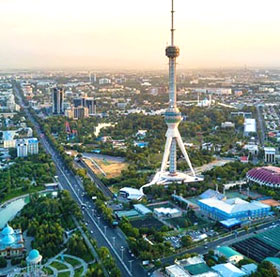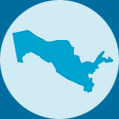- Argentina(Español)
- Österreich (Deutsch)
- Belgium(English)
- Belgique (Français)
- België(Nederlands)
- Brasil (Português)
- Canada(English)
- Canada (Français)
- Chile(Español)
- China(Chinese)
- Colombia(Español)
- Czechia(Czech)
- Denmark(Danish)
- República dominicana(Español)
- France (Français)
- Deutschland (Deutsch)
- Hungary(Hungarian)
- Italia(Italiano)
- 日本(日本語)
- Kazakhstan(Kazakh)
- Kazakhstan(Russian)
- Luxembourg(Français)
- Mexico(Español)
- Maroc(Français)
- Nederland(Nederlands)
- Panamá(Español)
- Perú(Español)
- Poland(Polish)
- Portugal (Português)
- Puerto Rico(Español)
- Romania(Romanian)
- Slovakia(Slovak)
- España (Español)
- Taiwan(Chinese)
- Tunisie(Français)
- Turkey(Turkish)
- Ukraine(Ukrainian)
- United States(English)
- Uruguay(Español)
- Venezuela(Español)
Risk Outlook February 2020-Uzbekistan

Since 2016, President Shavkat Mirziyoyev has liberalized the Uzbek economy, reforming the currency regime and courting foreign investment. But the political environment remains challenging and expropriation risks are elevated.
Security Environment
Under Mirziyoyev, relations with neighboring Kyrgyzstan and Tajikistan have improved.
Mirziyoyev has prioritized the diplomatic resolution of border disputes with both countries: 300km of the Kyrgyz-Uzbek border is disputed, while there are four Uzbek enclaves within Kyrgyzstan.
Improved bilateral relations should reduce the risk of border skirmishes in the medium term, while also resulting in fewer border closures.
Broader relations with Central Asian neighbors are also likely to continue improving in 2020.
In October 2019, Uzbekistan was accepted as a member of the Turkish Council, joining Azerbaijan, Kazakhstan, Kyrgyzstan, and Turkey. Membership could support increased cooperation on foreign policy and trade.
Both the Islamic Movement of Uzbekistan (IMU) and Islamic Jihad Union pose a terrorism risk in Uzbekistan.
Both groups' capabilities are concentrated in Ferghana Valley, Bukhara, and Tashkent, and can launch improvised explosive device attacks on government assets and security services.
However, the IMU's capabilities have been reduced by counter-terrorism operations in recent years. In July 2015, the group's field commander, Qoori Hikmatullah, was killed by the Afghan national army.
Moreover, the group announced its integration into Islamic State in 2015, shifting its strategic interests towards competing with the Taliban in Afghanistan. This is likely to reduce IMU’s operational capabilities in Uzbekistan.
Trading Environment
Since acceding to the presidency in 2016, Mirziyoyev has implemented a program of economic liberalization, ending decades of isolationism.
The country's development strategy for 2017-21 outlines plans to increase the private sector's role and reduce state interventionism.
In 2019, the government outlined privatization plans for a number of sectors, with initial public offerings suggested for the state mining companies, Almalyk Mining-Metallurgical Complex and Navoi Mining-Metallurgical Combinat.
Reforms have yielded benefits, with the country forecast to experience real GDP growth of 5.4% in 2020.
As part of its reform drive, the government devalued the currency by 50% in 2017, below the black-market rate, and eased currency restrictions. In August 2019, the Central Bank announced that the soum would move to a free-floating currency regime, and remaining currency restrictions would be removed — allowing individuals to purchase foreign currency for the first time.
Inflationary pressures pose a downside risk to Uzbekistan's economic outlook.
The soum lost 12.3% of its value against the dollar between January and October 2019, generating inflationary pressures linked to imported goods.
The inflation rate reached 20.5% at the start of 2018, before moderating to a forecasted rate of 12% in 2020.
The government is expected to pursue an expansionary fiscal policy, as it works to boost domestic demand through public investment.
Projects in the power and transport sectors are particularly likely to benefit. Major projects include the US$1.9 billion Pap-Angren Railway and a 100MW solar PV project in Navoi region.
Uzbekistan will also be reliant on financing from regional development banks and governments, given its limited access to international capital markets.
The Asian Development Bank, China Development Bank, and European Bank for Reconstruction and Development are particularly prominent financers of Uzbek projects.
In January 2019, Mirziyoyev signed an agreement with Indian Prime Minister Narendra Modi to export uranium to India in exchange for a US$200 million credit line.
Investment Environment
 Pricing Outlook
Pricing Outlook
1%-1.25% p.a
CEND Risk Pricing Range
1.95%-2.25% p.a
Sovereign Credit Risk Pricing Range
Mirziyoyev's reform agenda outlines plans to overhaul the judicial system, which currently lacks independence.
Courts are likely to rule in favor of the government and state-owned enterprises in commercial disputes, and may not honor international arbitration awards.
The government is keen to court foreign investment and, in the coming quarters, will work to avoid action that damages investor confidence. This should mitigate the risk of state contracts being cancelled or unilaterally revised.
However, expropriation risks remain elevated in Uzbekistan, and the government is unlikely to offer adequate compensation.
Reports suggest that, despite the reform agenda, Mirziyoyev may increase his family’s presence in key economic sectors, and could pressure firms that refuse to cooperate.
Reports suggested that in January 2017 government regulators placed pressure on the administration of Abu-Saxiy market in Tashkent, with the aim of forcing the owner, the son-in-law of former President Islam Karimov, to cede control to Mirziyoyev’s son-in-law.
Rating Outlook: War and Civil War; Country Economic Risk; Expropriation.
Key Takeaways
- Since acceding to the presidency in 2016, Shavkat Mirziyoyev has implemented a program of economic liberalization ending decades of isolationism.
- In August 2019, the Central Bank announced that the soum would move to a free-floating currency regime, and that remaining currency restrictions would be removed, allowing individuals to purchase foreign currency for the first time.
- The government is expected to pursue an expansionary fiscal policy, as it works to boost domestic demand through public investment. Projects in the power and transport sectors are particularly likely to benefit.
- Mirziyoyev's reform agenda outlines plans to overhaul the judicial system, which currently lacks independence.
- However, expropriation risks remain elevated in Uzbekistan, and the government is unlikely to offer adequate compensation.
Placeholder for editing the content for: marsh/components/content/rightrailtext
Placeholder for editing the content for: marsh/components/content/rightrailtext
Placeholder for editing the content for: marsh/components/content/rightrailtext
Placeholder for editing the content for: marsh/components/content/rightrailtext
Placeholder for editing the content for: marsh/components/content/rightrailtext
Related Resources
- Risk in Context Podcast: Shifting Political and Credit Risks
- Risk in Context Podcast: Shifting Political and Credit Risks
- Oil Price Dynamics: Economic Risks in the Middle East and Africa
- Political Risk Map 2020
- Political Risk Map 2020: Mid-Year Update for Middle East and Africa
Placeholder for editing the content for: marsh/components/content/rightrailtext